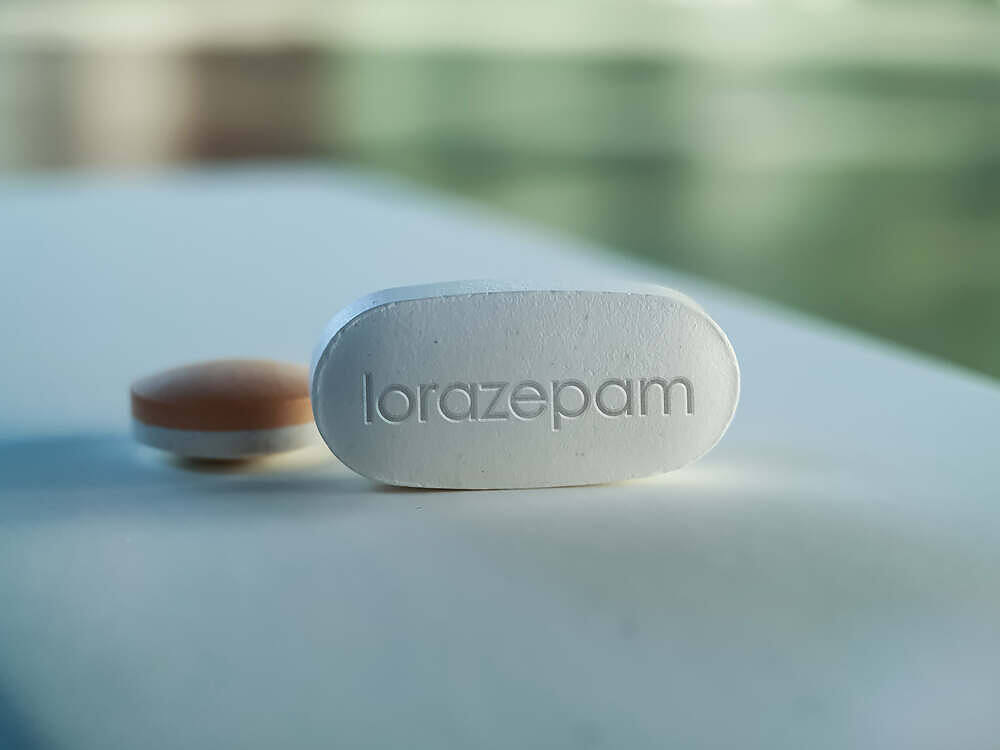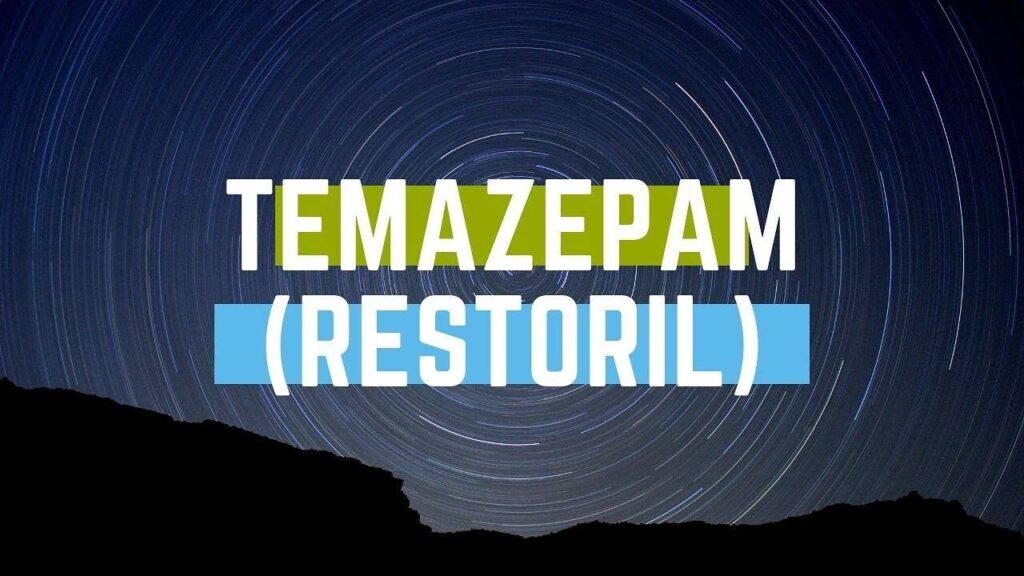
Lorazepam is a short-acting benzodiazepine that can lead to addiction and the need for rehab treatment.
Whilst not everyone prescribed Lorazepam will experience difficulties with the addictiveness of this drug, for the minority that is predisposed to addiction, this medication poses a high risk.
Read on to learn about Lorazepam, its uses, effects and risks. Further on, you can learn about the signs of Ativan addiction and the steps you can take if you think you may have a problem.
What is Lorazepam?
Ativan is the brand name for the pharmaceutical medication Lorazepam, a benzodiazepine used for the short-term treatment of panic disorders, severe anxiety and seizures. It is also approved for treating insomnia and sleep difficulties caused by anxiety and stress.
As a Benzodiazepine, it can potentially be used for alcohol withdrawal. However, due to its short-acting properties, other benzodiazepines such as Diazepam (Valium) and Chlordiazepoxide (Librium) are more suited to this process.
Lorazepam in Hospital
Lorazepam is often administered in hospitals to pre-medicate before surgery and stop status epilepticus (continuous seizures). Doctors can use it to calm breakthrough nausea/vomiting in chemo patients.
Lorazepam can be administered orally, intravenously, or sublingually (under the tongue).
Outside of a hospital environment, caution should be exercised when taking this medication. Tolerance and dependence on Ativan’s effects can form quickly. This is why it is recommended for short-term use only.
What Do I Need to Know About Ativan? : Its Risks & Effects
When you start taking Lorazepam, you may feel more tired than usual. It may also make you feel dizzy. Because of these effects, you are recommended not to drive or operate machinery until you are certain of your abilities.
Whilst taking Lorazepam, it is important that you do not consume alcohol or use opioid drugs. This is due to Ativan, alcohol and opioids being Central Nervous System depressants.
Mixing a benzodiazepine with alcohol or opioids will increase your risk for addiction. You will likely experience increased sedation, reduced impulse control, and slowed breathing and heart rate.
The main danger with mixing Lorazepam with alcohol or an opioid medication such as codeine or tramadol is that you may overdose. This can ultimately result in respiratory arrest and death.
If you are taking Lorazepam for an anxiety-related condition or insomnia, you may find your symptoms improve quickly within a few days. However, it is important to note that it does not cure anxiety or sleep disorders. It merely offers temporary relief of the symptoms. You must work through the causes of your condition with a therapist or counsellor for long-term relief.
The UK Law on Lorazepam
All benzodiazepine medications, including Lorazepam, are controlled class C drugs under the Misuse of Drugs Act. This means you can only get them legally with a prescription from a doctor.
The maximum sentence for possession of a Class C drug is two years in prison. A maximum sentence of 14 years and an unlimited fine is the punishment for a conviction for supplying and producing.
What to Avoid While Taking Lorazepam
Whilst taking Lorazepam, you should avoid:
- Alcohol
- Other benzodiazepine medications
- Recreational drugs
- Sleeping pills such as Zopiclone
- Making big decisions (Ativan may cloud your thinking and give you a false sense of well-being)
- Activities that require you to be alert, focused and able to concentrate (such as driving or operating heavy machinery)
- Any opiate medications, including over-the-counter medicines such as codeine, co-codamol and certain cough mixtures (check with your pharmacist)
If you are prescribed or take medications that conflict with the above advice, ensure that you talk through the possible side effects with your doctor or healthcare provider
Lorazepam Withdrawal
Before attempting to stop a benzodiazepine medication such as Lorazepam, you must contact your healthcare provider. Benzodiazepine withdrawal can be extremely dangerous if not managed correctly by medical professionals.
Lorazepam dependence can form quickly, within a matter of a few weeks of continuous use. For this reason, you should not stop taking Ativan abruptly. Your doctor can advise you of a safe tapering-off regime and support you should you require it.
Ativan is both physiologically and psychologically addictive. This means that not only can you develop a physical reliance on the drug, but also an emotional reliance. Whilst withdrawing from Ativan, you may experience both physical and psychological symptoms.
Lorazepam withdrawal symptoms can start as soon as you miss your next regular dose of the drug, typically within 4 to 6 hours of cessation. Symptoms peak between 1 and 4 days, depending on your pattern of use. The most severe benzodiazepine withdrawal symptoms should dissipate after 10 to 14 days of stopping the drug.
Physical Lorazepam withdrawal symptoms include:
- Increased sweating
- Insomnia
- Muscle aches and cramps
- Restless legs
- Tremors
- Nausea
- Dihhorea
- Stomach pain
- Decreased appetite
- Restlessness
- Changes in energy levels
- Cravings for Ativan
Psychological Ativan withdrawal symptoms include:
- Irritability
- Severe anxiety
- Vivid dreams
- Panic
- Depression
- Memory loss
- Confusion
- Severe mood swings
- Foggy or clouded thinking
- Impaired concentration levels
- Psychosis
In cases of heavy and prolonged use of Lorazepam, there is a risk of seizures. You will also be at risk of seizures if you have taken this medication for a seizure-related condition or previously experienced seizures.
Factors that affect the Lorazepam withdrawal timeline
Everyone experiences drug withdrawal differently. Whilst some will only experience uncomfortable physical symptoms, others will suffer from physical and psychological withdrawal.
The following factors can influence how severe your withdrawal symptoms are and how long they last:
- The dosage of Lorazepam you have become accustomed to taking
- Your biological chemistry and how you metabolise drugs
- The length of time you have been taking Ativan for
- The frequency of regular administration
- Any co-occurring mental health illnesses you suffer from
- Method of withdrawal
- Any additional dependencies on other drugs or alcohol
- Whether you suffer from addiction (in instances of Ativan addiction, strong drug cravings are likely)
Protracted withdrawal from Benzodiazepines
In heavy or long-term use of a benzodiazepine such as Ativan, withdrawal symptoms can be protracted for months. In some cases of chronic use, they can even last a year or more. This is known as Protracted Withdrawal Syndrome (PWS) or Post Acute Withdrawal Syndrome (PAWS)
Depending on the benzodiazepine and how long you have been taking it, it can take up to a month or more to completely clear from your system. Following this, you may still experience some withdrawal symptoms.
PAWS can be difficult to manage as symptoms can be wearing and ongoing. However, you can do a few things to diminish their severity and duration.

Self-Management of Ativan withdrawal PAWS at home:
- Take regular exercise – Exercise boosts the brain chemistry with feel-good chemicals, helping to counteract depression and anxiety (common PAWS symptoms)
- Work with a counsellor or therapist – A counsellor or therapist can teach you methods of managing your protracted benzodiazepine withdrawal symptoms. They also provide a safe space for you to talk through your concerns.
- Engage in a support group – Mutual aid support groups such as Narcotics Anonymous and Cocaine Anonymous are non-drug specific and can support you whilst you withdraw from Lorazepam.
- Follow an addiction recovery programme – A recovery programme provides structure and tools to help you avoid relapse and manage your emotions.
- Practice holistic therapies – Holistic therapies aim to increase your physical, emotional/spiritual and mental well-being. Such therapies include mindfulness, meditation and yoga.
- Reduce stress – Stress can make protracted withdrawal much worse. It is therefore recommended that you reduce your stress levels as much as possible, especially within the first year of recovery.
Signs of Lorazepam Addiction
Lorazepam abuse often starts with the recreational use of the drug. A person who abuses Lorazepam may not initially use it all the time. However, dependence and addiction can form as their tolerance to the drug’s effects grows.
Ativan addiction is very hard to break due to the severe withdrawal symptoms that can occur. Furthermore, as addiction is characterised by ‘craving’, a person with addiction problems will be prone to relapse.
Getting help quickly for an Ativan abuse problem can prevent a full-blown addiction. Addiction is not curable, but it is treatable and preventable.
Signs of Ativan abuse:
- Taking Ativan that does not belong to you
- Obtaining Ativan illicitly from the dark web or street dealers
- Changing the route of administration (i.e. crushing and snorting Lorazepam)
- Mixing Ativan with alcohol and drugs for a greater effect
- Taking more Ativan than prescribed or for longer than genuinely needed
- Using multiple doctors to access more prescriptions
- Lying to your doctor to get a prescription for Lorazepam
- Stockpiling Lorazepam and taking large amounts or bingeing on them
- Ordering Ativan from the internet without a prescription
If you or a loved one are abusing this powerful benzodiazepine, it is important to seek professional and medical help without delay.
Long-term abuse of Ativan can lead to addiction. Addiction is a very serious and chronic condition that causes negative effects on the user, eventually spilling into all areas of their life.
How a person becomes addicted to Lorazepam
Repeated abuse of a drug rewires the brain and damages the brain’s reward centre. The brain’s reward centre is programmed to release feel-good chemicals for engaging in healthy and life-sustaining activities. These activities include eating, exercising, hobbies and spending time with loved ones.
When an addictive drug is repeatedly abused, the brain rewires itself to place the drug as the primary source of rewarding chemicals.
Drugs such as Lorazepam can calm brain overactivity. At the same time, they release an abundance of feel-good chemicals. This makes someone using Ativan feel calm, relaxed and happy.
When a drug is abused, the high the user receives as a reward is much more pronounced. Over time and repeated exposure, the brain loses interest in other reward-stimulating activities in favour of the more pronounced high.
What this may look like in a person who is addicted is that they will continually think about Ativan and spend a lot of time taking it. They may appear excessively sleepy, have slurred speech, and be forgetful and unsteady on their feet.
Signs of Ativan addiction:
- Tolerance – Needing to take higher or more frequent doses of Ativan to gain the desired effects.
- Progression – Taking larger doses, mixing with alcohol or drugs, taking bigger risks and suffering more serious consequences as a result of Ativan use
- Dependence – Having a physical and emotional dependence on Lorazepam.
- Withdrawal – Suffering from physical and emotional withdrawal symptoms if unable to take Lorazepam
- Negative consequences – As addiction progresses, the sufferer will experience negative consequences to their health, mental well-being, social life, personal relationships, finances and occupation
- Inability to control, stop or moderate – A person with an addiction to Ativan will have little or no control over their use. They will feel compelled to seek out and take Ativan. This can happen even after a substantial period of abstinence.
- Craving – Drug addiction is characterised by craving. This is an overwhelming feeling and a need to get and take drugs despite the possible ramifications involved.
Lorazepam addiction is considered a life-threatening illness. The sufferer will be at high risk of an accident, overdose and death. They may also become acutely depressed and consider taking their own life.
The false promises of Ativan
The problem with benzodiazepine drugs such as Lorazepam is that they can make you feel ‘normal’ and function without experiencing high anxiety levels. This can seem like a Godsend for someone who has experienced crippling anxiety.
The reality is that once Lorazepam treatment is ceased, the original symptoms return. This is how many benzodiazepine addictions and dependencies start. Withdrawal from this drug will make symptoms even more pronounced. Is it little wonder that some people seek to get Ativan by other means or continue to take it rather than face the horror of withdrawal?
Treatment for Lorazepam addiction has three phases:
Phase one – Stopping the drug through a medical Lorazepam detox
Phase two – Rehabilitation. Rehabilitation must be bespoke and fully treat the underlying causes that contributed to Ativan addiction in the first place. The whole person must be treated, enabling them to rehabilitate physically, mentally, emotionally and socially.
Phase three – Ongoing care and support. Rehabilitation doesn’t just end. It is an ongoing process that involves support, therapy, family, aftercare and mutual aid meetings.

Treatment for Ativan Addiction
In the UK, we are lucky to have many free treatment options and private ones for those seeking help for an addiction.
The treatment that will work best for you or a loved one depends on the severity of the Lorazepam addiction and many personal factors. There is no one-size-fits-all method of addiction treatment.
Here, we look at the treatment options available and who they are best suited to:
NHS drug and alcohol teams
Local drug and alcohol teams can support a person while they detox from a drug. They also run groups and help a person with goal-setting. This option can work for someone who is extremely driven, still has an element of control around their drug use, and is committed to following the process through. Furthermore, it is free to access, and you can self-refer. You don’t need to see your doctor or request permission to do this.
Your doctor or GP
Your prescribing doctor can advise of a safe tapering-off regime from Lorazepam. They can also monitor your progress and offer low to moderate support (depending on the practice). Your GP can also refer you to the local mental health team to address any underlying mental health illnesses. This is crucial to ongoing recovery.
Mutual aid and support groups
Mutual aid and support groups for Lorazepam addiction offer a wealth of experience and support. What they cannot advise on or help with is the detoxification process. However, this option can work well if people combine their groups and meetings with professional medical care and advice. These groups are also free to attend and are easy to access in many parts of the country.
Inpatient detox for Ativan
Inpatient detox provides a professional-led medical detox. Clinically, this is the safest way to withdraw from an Ativan dependence. You will be prescribed approved medications to help alleviate and minimise withdrawal symptoms. At the same time, you will be monitored around the clock by a team of medical professionals to ensure your physical and emotional well-being.
A word of warning about detoxification. All detoxification essentially assists your brain and body to adjust while the dosage is tapered. It does not address the underlying complex issues that contribute to an addiction. Therefore, you will be at a very high risk of relapse upon completing your detox unless you start rehabilitation.
Outpatient rehab for Lorazepam addiction
Outpatient treatment within a rehab environment is only suited to those who have already managed to quit taking Ativan successfully. Each evening, after daycare rehab, you will return home. The temptation to use drugs and alcohol will still be there at the end of the day. The focus of outpatient rehab will be on rehabilitation, which can only be beneficial once all drugs have been removed from a person’s system.
Inpatient rehab for Ativan addiction
Yes, private rehab can be costly, but residential treatment can be extremely effective. It may also be more affordable than you think. Inpatient rehab combines the three core elements of addiction treatment. It especially suits those who have tried other Ativan detoxification methods but have failed to get or stay clean.
Residential rehab treatment includes the following evidence-based addiction treatments, all delivered by a team of multidisciplinary professionals:
- Full bespoke medical detox
- 24/7 care and monitoring
- Bespoke Ativan addiction rehabilitation programme
- Individual therapy
- Group therapy
- Family therapy and support
- Addiction education
- CBT & DBT
- Psychotherapy
- Medical treatment
- Treatment for dual diagnosis and co-occurring mental health conditions
- Treatment for additional addictions
- Trauma healing
- Relapse prevention strategies
- Addiction recovery programme
- Holistic therapies: mindfulness, meditation, yoga, reiki, music, art, acupuncture, etc
- Exercise programme
- Nutrition
- Detailed discharge and aftercare package
Each CQC rehab will offer a combination of different therapies and levels of accommodation and vary in price.
Call us today to find out the best rehab package to suit your individual treatment needs and circumstances.
Stats on Ativan and Lorazepam Misuse
- In 2021, in England and Wales, 40% of all seizures of Class C drugs involved benzodiazepines.
- In the US, according to statistics from the National Institute on Drug Abuse (NIDA) 2020, 2.2% (or about 6.2 million people) reported misusing prescription tranquillisers or sedatives in the past 12 months.
- Recently, a range of illicitly produced benzodiazepines has become widely available across the UK. Not all these variants are controlled under the Misuse of Drugs Act and often contain dangerous levels of the drug.
- There have been increasing numbers of deaths involving benzodiazepines in 2020 (a rise of 19.3% when compared with 2019, from 399 to 476 deaths).
Common Ativan Questions & Answers
No schema found.References
- Lorazepam
- Ativan (Lorazepam)
- The benzodiazepine withdrawal syndrome
- Seizures of drugs in England and Wales, financial year ending 2021
- Misuse of Prescription Drugs Research Report
- https://assets.publishing.service.gov.uk/government/uploads/system/uploads/attachment_data/file/881969/ACMD_report_-_a_review_of_the_evidence_of_use_and_harms_of_novel_benzodiazepines.pdf
- Deaths related to drug poisoning in England and Wales 2020



